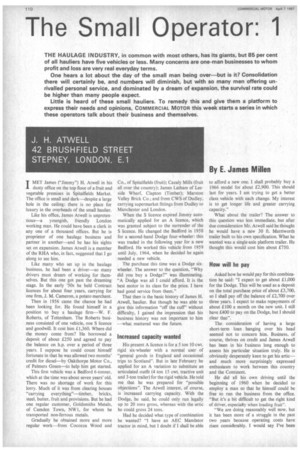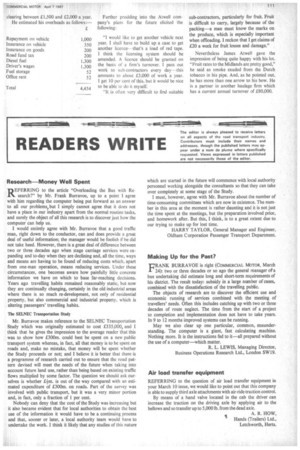The Small Operator: 1
Page 112

Page 113

If you've noticed an error in this article please click here to report it so we can fix it.
THE HAULAGE INDUSTRY, in common with most others, has its giants, but 85 per cent of all hauliers have five vehicles or less. Many concerns are one-man businesses to whom profit and loss are very real everyday terms.
One hears a lot about the day of the small man being over—but is it? Consolidation there will certainly be, and numbers will diminish, but with so many men offering unrivalled personal service, and dominated by a dream of expansion, the survival rate could be higher than many people expect.
Little is heard of these small hauliers. To remedy this and give them a platform to express their needs and opinions, COMMERCIAL MOTOR this week starts a series in which these operators talk about their business and themselves.
J. H. ATWELL 42 BRUSHFIELD STREET STEPNEY, LONDON, El
By E. James Millen
T MET James ("Jimmy") H. Atwell in his 1 dusty office on the top floor of a fruit and vegetable premises in Spitalfields Market. The office is small and dark—despite a large hole in the ceiling: there is no place for luxury in the overheads of the small haulier.
Like his office, James Atwell is unpretentious—a youngish, friendly London working man. He could have been a clerk in any one of a thousand offices. But he is proprietor of one haulage business and partner in another—and he has his sights set on expansion. James Atwell is a member of the RHA who, in fact, suggested that I go along to see him.
Like many who set up in the haulage business, he had been a driver—so many drivers must dream of working for themselves. But this one got past the dreaming stage. In the early '50s he held Contract licences for about four years, carrying for one firm, J. M. Cameron, a potato merchant.
Then in 1956 came the chance he had been looking for. He found himself in a position to buy a haulage firm—W. F. Roberts, of Tottenham. The Roberts business consisted of one vehicle, one S licence and goodwill. It cost him £1,360. Where did the money come from? He borrowed a deposit of about £250 and agreed to pay the balance on h.p. over a period of three years. I suppose he could count himself fortunate in that he was allowed two months' credit for diesel—by Oakthorpe Motor Co., of Palmers Green—to help him get started.
This first vehicle was a Bedford 6-tonner, which at the time was about seven years' old. There was no shortage of work for this lorry. Much of it was from clearing houses "carrying everything"—timber, bricks, steel, butter, fruit and provisions. But he had one regular customer, Goldsmiths Metals, of Camden Town, NW!, for whom he transported non-ferrous metals.
Gradually he obtained more and more regular work—from Cocozza Wood and Co., of Spitalfields (fruit); Cazaly Mills (fruit all over the country); James Latham of Leeside Wharf, Clapton (Timber); Marston Valley Brick Co.; and from CWS of Dudley, carrying supermarket fittings from Dudley to Manchester and London.
When the S licence expired Jimmy automatically applied for an A licence, which was granted subject to the surrender of the S licence. He changed the Bedford in 1958 for a second-hand Dodge four-wheeler: this was traded in the following year for a new Bedford. He worked this vehicle from 1959 until July, 1964, when he decided he again needed a new vehicle.
The purchase this time was a Dodge sixwheeler. The answer to the question, "Why did you buy a Dodge?" Was illuminating. "A Dodge was all I could afford. It is the best motor in its class for the price. I have had good service from them."
That then is the basic history of James H. Atwell, haulier. But though he was able to give this information "off the cuff" without difficulty, I gained the impression that his business history was not important to him —what mattered was the future.
Increased capacity wanted
His present A licence is for a 5 ton 10 cwt. rigid six-wheeler with a normal user of "general goods in England and occasional trips to Scotland". But in late February he applied for an A variation to substitute an articulated outfit (4 ton 15 cwt. tractive unit and 3-ton trailer) for the rigid vehicle. He told me that he was prepared for "possible objections". The Atwell interest, of course, is increased carrying capacity. With the Dodge, he said, he could only run legally up to 20 tons gross, whereas with the artic he could gross 24 tons.
Had he decided what type of combination he wanted? "1 have an AEC Mandator tractor in mind, but I doubt if I shall be able to afford a new one. I shall probably buy a 1966 model for about £2,900. This should last for years. I am trying to get a better class vehicle with each change. My interest is to get longer life and greater carrying capacity."
What about the trailer? The answer to this question was less immediate, but after due consideration Mr. Atwell said he thought he would have a new 30 ft. Merriworth trailer built to his own specification. What he wanted was a single-axle platform trailer. He thought this would cost him about £750.
How will he pay Asked how he would pay for this combination he said: "I expect to get about £1,000 for the Dodge. This will be used as a deposit on the total purchase price of about £3,700, so I shall pay off the balance of 12,700 over three years. I expect to make repayments of about £100 a month on the new unit. I still have £400 to pay on the Dodge, but I should clear that".
The consideration of having a large short-term loan hanging over his head seemed not to concern him. Business, of course, thrives on credit and James Atwell has been in his husiness long enough to assess his particular situation truly. He is obviously desperately keen to get his articand much more surprisingly expressed enthusiasm to work between this country and the Continent.
He did all his own driving until the beginning of 1960 when he decided to employ a man so that he himself could be free to run the business from the office. "But it's a bit difficult to get the right kind of driver, especiaHy when loading fruit".
"We are doing reasonably well now, but it has been more of a struggle in the past two years because operating costs have risen considerably. I would say I've been
clearing between £1,500 and £2,000 a year. He estimated his overheads as follows:— Further prodding into the Atwell company's plans for the future elicited the following:
"I would like to get another vehicle next year. I shall have to build up a case to get another licence—that's a load of red tape. I think the licensing system should be amended. A licence should be granted on the bask of a firm's turnover. I pass out work to sub-contractors every day—this amounts to about £3,000 of work a year. I get 10 per cent of this, but it would be nice to be able to do it myself.
"It is often very difficult to find suitable
sub-contractors, particularly for fruit. Fruit is difficult to carry, largely because of the packing—a man must know the marks on the produce, which is especially important when offloading. I reckon that I get claims of £20 a week for fruit losses and damage,"
Nevertheless James Atwell gave the impression of being quite happy with his lot. "Fruit rates to the Midlands are pretty good," he said as smoke exuded from the Dutch tobacco in his pipe. And, as he pointed out, he has more than one arrow to his bow. He is a partner in another haulage firm which has a current annual turnover of £80,000.
































































































































































